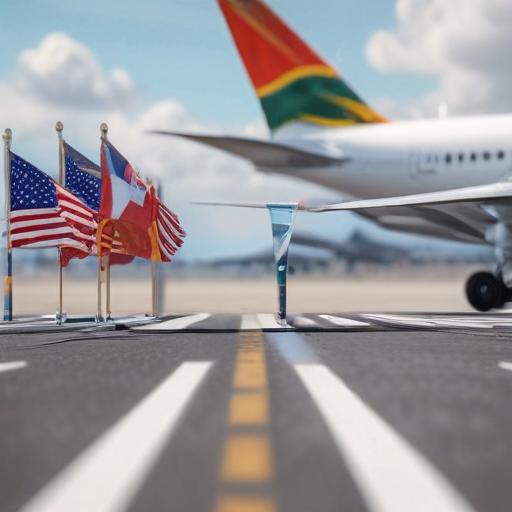A group of 49 white South Africans, primarily Afrikaners, departed Johannesburg on a private charter plane for the United States on Sunday, marking the first relocation under a program announced by the Trump administration in February. This initiative grants refugee status to those claiming persecution due to alleged discrimination by the South African government, which has been vehemently denied by South Africa officials.
The group, consisting of families and small children, is set to arrive at Dulles International Airport near Washington, D.C., where they will be greeted by officials from the U.S. government, including the deputy secretary of state. South Africa’s transport ministry spokesperson, Collen Mbisi, indicated that the refugees were accompanied by police and airport officials to ensure their backgrounds were clear of criminal cases or warrants.
The South African government has labeled claims of persecution as “completely false,” asserting that Afrikaners, descendants of Dutch and French settlers, remain amongst the country’s most economically privileged individuals. Despite this, the Trump administration has fast-tracked their applications while halting other refugee programs from war-torn regions, drawing criticism from various refugee groups regarding the prioritization of these relocations.
Trump’s executive order, which accused South Africa of enforcing anti-white policies through affirmative action laws and land expropriation, has led to an extensive debate on the validity of these claims. It’s significant to note that, while the South African authorities have dismissed accusations of racial discrimination, the contentious land expropriation law remains a focal point of discussion within the nation and beyond.
This relocation effort is part of a broader policy shift under the Trump administration, which has sought to redefine refugee qualifications amidst changes in immigration laws and practices. Stephen Miller, the White House deputy chief of staff, has publicly stated that the circumstances surrounding the Afrikaners align with the original intentions behind the refugee program.
As this historic flight marks a pivotal moment in U.S.-South Africa relations, it opens up the dialogue on race, immigration, and the complexities of refugee status. The South African government has expressed that while it does not support the decision for relocation, it respects the individuals’ choice to seek better opportunities abroad.
While this development raises eyebrows regarding racial dynamics in South Africa, it also presents an opportunity for the affected families to start anew in the U.S. With support from the U.S. Department of Health and Human Services, including assistance with housing and other essential needs, these individuals may find a pathway to rebuild their lives amid ongoing controversies regarding their departure.
As society grapples with these issues, it’s essential to recognize the importance of a fair and just refugee system, one that prioritizes genuine needs regardless of race, and to foster conversations around inclusivity and equality in both South Africa and the United States.
